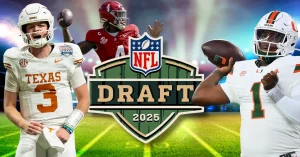The Debate Over Gambling Advertising in Sports: When Is It Too Much?

You and your buddies have congregated around the 85-inch big screen, hi-def TV, and are watching an NFL game. It’s Sunday, and Sunday is for the boys! But you start to notice that every other commercial break has an ad (or maybe two) from a betting company. It doesn’t bother you because y’all like to wager, but it seems like overkill. You aren’t wrong—a recent study discovered that during a single game, viewers are exposed to over 50 gambling-related messages. This inundation of ads shows that betting and advertising during sports have both risen in popularity and prevalence. But is it too much?
Sports betting is now legal in some states, so there has been a huge surge in advertising from betting companies. These platforms are capitalizing on the growing market and investing heavily in commercials, sponsorships, and digital ads. The sports industry has become the main battleground for these ads, with everything from stadium billboards to jersey sponsorships featuring gambling promotions. This explosion in advertising has changed the arena of sports broadcasting and marketing.
As gambling ads become increasingly frequent in sports, a conversation has popped up over what the appropriate level of advertising should be. While these ads undoubtedly bring economic benefits to sports organizations, they also raise a few concerns about the impact on viewers—particularly younger audiences. It’s an ongoing debate over gambling advertising in sports: when is it too much? We’re getting in on the discourse to see if there is a balance to be found between financial gain and social responsibility in the world of sports betting ads!
The Current Landscape of Gambling Advertising in Sports
Sports betting advertising has absolutely exploded and has changed the sports industry—but is it for the better? Below, we’ll look at the current state of gambling advertising in sports, examining spending statistics, different types of ads, and how their frequency differs across sports and countries.

Statistics on Gambling Ad Spending in Sports
When The Supreme Court lifted the federal ban on sports betting in 2018, the market grew exponentially. In 2023, the total sports betting handle in the U.S. reached $119.84 billion, a 28% increase from 2021. But not so fast—advertising spending has seen a big dip. In 2023, ad spending dropped by 21% compared to the previous year, totaling a $210 million reduction. This decrease is part of a bigger trend as the industry matures and companies shift their focus from drawing in new customers to retaining their existing base.

Types of Gambling Advertisements in Sports
- TV Commercials During Games: Television is the main medium for sports betting advertisements. Companies like FanDuel and DraftKings heavily invest in TV ads to grab the attention of sports fans during live broadcasts. Despite a recent reduction in spending, TV ads are still a major part of their advertising strategy. The volume of TV ads for sports betting has decreased by 33% since 2021 but continues to be a large part of their budgets.
- Stadium Signage and Sponsorships: Stadiums and arenas are prime spots for gambling advertisements. From billboards and LED signage to sponsorship deals that place betting company logos on team jerseys and throughout the stadiums, these ads target both fans who are at the live games and those watching on TV.
- Team and League Partnerships: Betting companies form partnerships with teams and leagues, including exclusive betting rights and joint marketing campaigns. Major leagues like the NFL, NBA, and MLB have all struck deals with betting companies, leveraging the popularity of teams and athletes to reach the biggest possible audience.
- Online and Mobile Advertising: Digital ads play a big part in sports betting companies’ marketing strategies. They appear on social media platforms, sports news websites, and mobile apps, targeting users based on their browsing habits and interests. The convenience and ease of placing bets via mobile betting apps make digital advertising a critical component for engaging with potential bettors.

Comparison of Gambling Ad Prevalence Across Different Sports and Countries
The presence of gambling advertisements varies greatly across different sports and countries. In the U.S., sports like football, basketball, and baseball get the highest concentration of gambling ads due to their massive viewership. Conversely, sports like hockey and soccer see relatively fewer ads from betting companies.
Internationally, the situation is much different. In the U.K., the saturation of gambling ads during soccer matches has led to much public concern and calls for stricter regulations. Australia also experiences a high volume of gambling ads, prompting similar debates over advertising limits.
In countries with stricter regulations on sports betting, the volume of advertisements is obviously much lower. For instance, several European countries have super strict advertising rules that keep the presence of gambling ads in check, in stark contrast with markets like the U.S. and the U.K.
The Arguments for Gambling Advertising in Sports
Gambling ads in sports are a hotly debated topic, but the proponents argue the numerous benefits of this tactic. From economic boosts to fan engagement, the presence of these ads is way more than a financial maneuver. Below, we look at the arguments in favor of gambling advertising in sports!

Economic Benefits
One of the strongest arguments for gambling advertising in sports is the substantial revenue it brings in for sports leagues and teams. Legal sports betting is projected to add billions to the economy; the four major U.S. sports leagues—NFL, NBA, MLB, and NHL—are expected to collectively earn $4.2 billion annually from legal sports betting. This revenue comes from direct spending by betting operators on advertising, data partnerships, and sponsorships, as well as increased consumption of the league’s media and products.
This influx of money goes a long way toward improving the financial health of sports organizations, enabling them to invest in better facilities, higher player salaries, and better fan experiences. The MLB stands to gain $1.1 billion, while the NFL could see $2.3 billion in revenue from legal sports betting.

Job Creation in the Gambling and Advertising Industries
The legalization and regulation of sports betting also contribute to job creation! This burgeoning industry requires a workforce to support operations, from sportsbook operators and marketers to hospitality staff and technology experts. In states like New Jersey, the introduction of legalized sports betting has generated thousands of jobs, a trend consistent across other states that have adopted regulation.
The economic ripple effects extend beyond direct employment. Ancillary businesses like sports bars, merchandise stores, and local event planners also benefit from the sports betting industry, giving local economies a boost as well.

Fan Engagement and Entertainment Value
Gambling advertising also increases fan engagement and entertainment value. Betting makes watching sports way more exciting, as fans have a financial stake in the outcomes. This increased engagement means higher viewership ratings for games, benefiting broadcasters and advertisers alike.
Moreover, partnerships between betting companies and sports leagues can create innovative fan experiences. For instance, some sports bars now offer integrated betting experiences, allowing fans to place bets while watching the game in a social setting.

Normalization of a Legal Activity
Another argument in the pro column for gambling advertising is that it helps to normalize a legal activity. With the proliferation of illegal betting sites that lack age restrictions and consumer protections, promoting legal betting options verifies that consumers are aware of safe, regulated alternatives. This helps steer them away from the black market and to legal platforms that are all subject to the strictest regulatory standards.
By integrating gambling ads into mainstream sports, it also helps to destigmatize the activity. When conducted responsibly, sports betting is a legit form of entertainment, and advertising helps to communicate this to the public!

Potential for Responsible Gambling Education
Gambling advertisements can play an important and necessary role in promoting responsible gambling. All legitimate betting companies have to include responsible gambling messages in their ads, educating consumers on the importance of betting within their means and providing resources for those who may need help with a gambling problem.
These ads include info about self-exclusion programs, betting limits, and hotlines for gambling addiction. By embedding these messages into their advertising campaigns, companies raise awareness and encourage responsible behavior among bettors, which is a must.
While the debate over gambling advertising in sports continues, there are some compelling arguments in its favor. The economic benefits, increased fan engagement, normalization of legal betting, and potential for responsible gambling education all contribute to the case for maintaining and even expanding gambling ads in the sports industry.
The Arguments Against Excessive Gambling Advertising
And now for the arguments against excessive gambling ads, and there are some doozies when it comes to concerns about its possible negative impacts. They span from encouraging problem gambling to ethical issues surrounding the targeting of vulnerable populations. Here are the arguments against it:

Potential for Increased Problem Gambling
Excessive gambling advertising can have a detrimental effect on vulnerable groups, including youth and those who are recovering from addiction. Research indicates that exposure to gambling ads increases the likelihood of risky betting behaviors, particularly among young people. In a study by the Australian Institute of Family Studies, research found that one in five young women and one in seven young men started betting for the first time after seeing or hearing an ad on TV. Among those at risk of gambling harm, 41% tried a new form of betting, and 40% bet impulsively due to advertising.
The normalization of gambling through advertising can also increase problem gambling behaviors, which is really concerning for younger viewers who are more impressionable and might not fully understand or grasp the risks that are involved. The constant exposure to gambling ads can make betting look like a routine, harmless activity, which it is not for those who are prone to addictive or impulsive behaviors.

Normalization of Gambling Behavior
The proliferation of gambling advertisements normalizes betting as a regular part of sports culture, which can desensitize audiences to the dangers of gambling and contribute to an increase in gambling-related problems. The American Psychological Association found that gambling ads can influence the brain, particularly in how they affect impulse control and decision-making, making it easier for people to fall into problematic gambling patterns.

Integrity Concerns in Sports
- Perception of Conflicts of Interest: The heavy presence of gambling advertisements can lead to perceptions of conflicts of interest within sports. When leagues and teams are financially tied to betting companies, it raises some questions about the integrity of the games. Fans might start to doubt the fairness of the sports they love, suspecting that decisions on the field could be influenced by betting interests.
Match-Fixing and Spot-Fixing Risks: The link between gambling and sports integrity is further complicated by the risk of match-fixing and spot-fixing. High-profile scandals, like those involving college and professional athletes betting on their own sports, underscore the potential for corruption. The ease with which bets can be placed online exacerbates these risks, making it easier for those involved in the sport to engage in illicit betting activities.

Oversaturation and Fan Annoyance
This might seem like a small problem, but it’s not—if the fans get annoyed and irritated or see too many sports ads, they could become turned off and turn off the game. Viewers might get fatigued or even angry about the constant barrage of betting ads, which will detract from their enjoyment of watching a game. This annoyance is not solely about the frequency of ads but also about their intrusive nature—fans tune in to watch sports, not to be continuously sold on gambling opportunities. If you lose the fans, you’re in trouble.

Ethical Concerns About Targeting Sports Fans
There are also some important ethical concerns regarding gambling companies’ targeting of sports fans. Sports fans usually have a strong emotional connection to their teams and games, which can be exploited by gambling advertisements. An emotional engagement can turn into impulsive betting decisions, particularly when fans are caught up in a game.
Furthermore, the targeting of sports fans can have a broader societal impact. The normalization of gambling through sports can contribute to a culture where betting is seen as a necessary component of enjoying sports rather than a fun and completely optional activity. This cultural shift can have long-term consequences, including increased rates of gambling addiction and financial problems among sports fans.
Yes, gambling ads in sports bring in a ton of revenue and engage fans, but the potential negative impacts cannot be ignored. The risks of increased problem gambling, compromised sports integrity, fan irritation, and ethical concerns about targeting vulnerable populations show the need for a more cautious approach to gambling advertising in the sports industry.
The Impact on Different Stakeholders
Now let’s take a look-see at how exactly different groups are impacted by this surge in gambling promotions!
Sports Fans
It’s all about the fans, right? Maybe! But if it isn’t, it should be—they are the sports world’s bread and butter.

Casual vs. Serious Fans
Gambling ads affect sports fans differently based on their level of engagement. Casual fans might find these ads just a momentary distraction, but serious fans, who are super invested in sports, could be more susceptible to frequent betting. The constant exposure can turn watching sports from a leisurely pastime into a high-stakes experience, where the fun of the game is now laced with the anxiety of gambling outcomes.

Demographics Most Affected
Young adults, particularly males aged 18-34, are the most impacted by gambling ads. This demo is often targeted due to their high engagement with sports and their propensity to take risks. Studies show that young people are more likely to start betting due to advertising, with a portion doing so impulsively. This can lead to the normalization of gambling behaviors and increase the danger of developing gambling problems later in life.

Athletes and Sports Personalities
Athletes and sports personalities can face pressure to endorse gambling products, and while this can be a lucrative opportunity, it also comes with hazards. Endorsing betting companies might conflict with an athlete’s personal values or the values they want to project—involvement in gambling promotions can impact their personal brand and legacy, particularly if gambling becomes associated with scandals or if the athlete is viewed as promoting harmful behavior.

Sports Leagues and Teams
- Balancing Revenue with Ethical Considerations: Sports leagues and teams obviously benefit financially from gambling partnerships, but they have to balance any gains with ethical considerations. The influx of money from gambling ads helps support various aspects of the sport, from player salaries to infrastructure. Yet, these partnerships can also turn into public relations nightmares if fans feel that their integrity is compromised.
Long-Term Impact on Sport Integrity and Fan Trust: The relationship between sports leagues and gambling companies can affect the integrity of the sport. Concerns about match-fixing and the potential for conflicts of interest can chip away at fan trust. When the public perceives that the outcomes of games might be influenced by betting interests, it undermines the essence of fair competition that is so central to sports.

Broadcasters and Media Companies
Broadcasters and media companies also gain substantial revenue from gambling advertisements. However, they face the challenge of upholding their editorial integrity. The over-saturation of betting ads can annoy viewers and diminish the quality of the broadcast experience. There is a delicate balance between capitalizing on advertising revenue and preserving the trust and engagement of the audience!

Children and Young Sports Fans
- Exposure to Gambling Messaging: Children and young sports fans are particularly vulnerable to the influence of gambling ads. These advertisements make gambling seem like a common and integral part of sports culture. Research has shown that children exposed to these types of ads are more likely to develop favorable attitudes toward gambling and could start betting at a younger age.
Long-Term Effects on Attitudes Towards Gambling: Early exposure to gambling advertising can have long-term effects on young people’s attitudes toward gambling. It can normalize risky behaviors and increase the likelihood of developing gambling-related problems later in life. This is a big concern for parents and educators, who worry about the messages these ads send to impressionable young minds.
Regulatory Landscape and Challenges
While regulations do try to keep up with the changing landscape, it’s complicated and changes across regions, so it’s no easy task! Below, we’ll examine the current regulations, the industry’s self-regulation efforts, the challenges of regulating online and global advertising, and a few regulatory changes.

Current Regulations on Gambling Advertising in Sports
The regulatory environment for gambling advertising in sports varies wildly across different countries and jurisdictions. In the United States, regulations are primarily state-driven, creating a patchwork of rules that gambling companies have to navigate. In states like New Jersey and Pennsylvania, there are strict licensing and advertising requirements, while other states are more lenient.
In contrast, the United Kingdom has implemented comprehensive regulations through the Gambling Commission, which oversees all gambling advertising. Recent updates include stricter controls on the targeting of vulnerable populations and limits on the times and channels through which gambling ads can be broadcast. Similarly, Italy has taken a hard stance with an outright ban on all forms of gambling advertising, including sports sponsorships, to protect the public’s health and well-being.

Self-Regulation Efforts by the Gambling Industry
The gambling industry has also taken steps toward self-regulation to lessen potential harms and promote responsible advertising. In the UK, the Betting and Gaming Council (BGC) has introduced a Code of Conduct for Socially Responsible Advertising. This code mandates that a portion of advertising should promote safer gambling messages and that digital marketing should be restricted to audiences aged 25 and over unless age verification can be verified.
In the US, the American Gaming Association (AGA) has established the Responsible Marketing Code for Sports Wagering, which sets guidelines for advertising placement to guarantee that a major portion of the audience is of legal betting age and includes mandates for promoting responsible gambling practices.

Challenges in Regulating Online and Global Sports Betting Advertising
Regulating online and global sports betting advertising presents a set of novel challenges. The internet’s borderless nature means that ads can easily reach audiences in jurisdictions where this kind of advertising is restricted or banned. This has led to calls for stronger international cooperation and coordination of regulations to control online gambling ads effectively.
Another big challenge is the rapid technological advancements and the use of targeted advertising techniques. Digital platforms use sophisticated algorithms to target potential bettors, making it difficult for regulators to monitor and control the content successfully. Additionally, the anonymity afforded by the internet means there is an increase in unlicensed operators or shady gambling sites, further complicating regulatory efforts.
Case Studies of Regulatory Changes
Italy is the most prominent example of the strongest regulatory measures—the country outright banned gambling advertising in 2019. The “Dignity Decree” prohibits all forms of gambling promotion, including sports sponsorships. This move was aimed at reducing gambling-related harm and protecting vulnerable groups from excessive exposure to gambling ads. While the ban has definitely reduced the visibility of gambling in public media, it has also kicked off debates about its impact on sports funding and media revenue.

Other Notable Regulatory Changes
- United Kingdom: The UK’s updated Gambling Act includes measures to protect young people and vulnerable adults from gambling-related harm. The introduction of new advertising standards, such as the prohibition of celebrities and sports personalities in gambling ads that appeal to minors, represents a significant shift in policy. Additionally, the government is considering further restrictions on gambling sponsorships in sports to curb the influence of these ads on younger audiences.
- Australia: The Australian government has implemented restrictions on gambling ads during live sports broadcasts, particularly during hours when children are likely to be watching. These measures include banning ads during sporting events from 5 a.m. to 8:30 p.m. and stricter enforcement of advertising content standards to ensure responsible messaging.
- United States: The proposed SAFE Bet Act in the US aims to introduce federal oversight for sports betting advertising, addressing concerns about the impact of these ads on public health. The bill proposes restrictions on the timing of ads, limits on the number of deposits a person can make in a day, and mandatory inclusion of responsible gambling messages in all promotions.
Responsible Advertising Practices
As gambling advertising continues to grow, making sure it is done responsibly is the biggest concern. This involves setting guidelines that protect vulnerable groups while promoting fair play. Here’s a look at some of the best practices in responsible gambling advertising!

Watershed Hours for Gambling Ads
Watershed hours are designated times during which gambling advertisements are restricted to minimize exposure to vulnerable audiences, particularly children. In the UK, the “whistle to whistle” ban prohibits gambling ads from being shown during live sports broadcasts before 9 pm. This policy has greatly reduced the number of gambling ads seen by children during these hours, dropping by 97% within its first year of implementation. This approach has been pretty effective in making sure that younger viewers are not unduly influenced by gambling promotions during times they are most likely to be watching the tube.

Content Restrictions
Content restrictions are really important in responsible advertising—one example is the American Gaming Association’s Responsible Marketing Code for Sports Wagering, which prohibits the use of celebrities, cartoon characters, or any imagery that will appeal primarily to those under the legal gambling age. Additionally, these ads cannot suggest that gambling is a way to achieve financial or social success, nor should they insinuate that gambling is a risk-free pastime. These measures make sure that ads are targeted appropriately and do not exploit vulnerable demographics.

Mandatory Inclusion of Responsible Gambling Messages
Incorporating responsible gambling messages in advertisements is another main practice. The Betting and Gaming Council in the UK mandates that at least 20% of TV and radio ads for gambling have to promote responsible gambling. These messages include reminders to bet responsibly and provide info about helplines for those struggling with gambling problems. By embedding these messages within their marketing efforts, companies help educate the public about the possible dangers that are associated with gambling and provide resources for those who need help.

Targeting and Exclusion Technologies
Advanced targeting and exclusion technologies play a critical role in protecting vulnerable groups from gambling ads. Social media platforms and search engines can utilize age verification systems to guarantee that gambling ads are only shown to users who are legally allowed to gamble. The Betting and Gaming Council’s code requires that all social media ads be targeted at consumers aged 25 and over unless the platform can accurately verify that the audience is over 18. Additionally, digital marketing tools can exclude certain demographics from viewing gambling ads based on their behavior and online activity, further reducing the risk of exposure among vulnerable populations.
The Role of Technology
The gambling industry has been super quick to welcome and take advantage of technology, using it to create highly personalized marketing campaigns, leverage data analytics, and tap into new platforms like streaming services and social media. While these innovations are amazing benefits in terms of engagement and revenue, they also present ethical dilemmas and regulatory challenges. Let’s take a look at the various ways technology molds gambling advertising and the implications of these practices.

Personalized Advertising and Its Ethical Implications
Personalized advertising uses detailed data about individuals’ habits and preferences to deliver tailored marketing messages. In the gambling sector, this means that ads are specifically designed to appeal to a user’s betting patterns and interests.
- Ethical Concerns: There are big ethical concerns associated with personalized advertising—one of them being the potential exploitation of vulnerable people. Those at risk of gambling addiction can be targeted with tempting promotions, increasing their chances of relapse or more involvement in gambling. Furthermore, the use of personal data raises privacy concerns. Users aren’t always fully aware of how their info is being collected and used, which can make them feel violated and distrustful.

Use of Data Analytics in Targeting Sports Fans
Data analytics is a really powerful tool for gambling companies, enabling them to analyze massive amounts of info to better understand their audience. This means they can create the most precise and effective marketing strategies.
- Behavior Tracking: By monitoring user behavior, companies can tailor their offerings to match the preferences and habits of each gambler. This means that a fan who frequently bets on basketball games will receive targeted promotions for upcoming games or special betting opportunities related to their fav teams.
- Risk Management: Beyond improving the user experience, data analytics can also play an important role in identifying and mitigating gambling-related risks. By analyzing betting patterns, companies can detect signs of problem gambling early and take steps to provide support or intervention. This aligns with bigger efforts to promote responsible gambling and protect vulnerable users.

Emerging Platforms and Their Impact
Newer platforms, like streaming services and social media, have refashioned gambling advertising—they offer new ways to engage with potential customers while also presenting distinct difficulties.
- Streaming Services: The integration of gambling advertisements into live streaming services has created a seamless experience for viewers, who can place bets while watching their favorite events. However, this constant exposure can be problematic, particularly for younger audiences who are more likely to use these platforms.
- Social Media: Social media platforms enable highly targeted advertising, which can be both a benefit and a drawback. While these ads can be successfully directed at users of legal gambling age, they also run the risk of reaching underage individuals. To address this, responsible advertising practices must include strict age verification systems and crystal clear guidelines on content restrictions to protect younger users.
Public Opinion and Changing Attitudes
Gambling ads have become ubiquitous in sports, sparking varied public opinions and changing attitudes. Understanding these perspectives, especially through survey data, generational differences, and the impact of high-profile gambling cases, provides a clearer picture of societal views on this issue.

Survey Data on Public Perception of Gambling Ads in Sports
Public opinion on gambling advertisements in sports is divided, showing a range of concerns and attitudes. According to an Ipsos poll, while a segment of the public sees sports betting as an engaging aspect of the sports experience, a substantial portion remains wary. About one-third of Americans feel that sports betting can improve engagement with sports, but many are concerned about the risks associated with gambling addiction.
A St. Bonaventure University survey shows that 39% of Americans have an online sports betting account, indicating significant participation in sports betting. However, 65% of respondents agree that online sports betting could lead to compulsive gambling, causing harm to individuals and their families. This data suggests a tension between the perceived entertainment value of sports betting and its potential negative impacts.
In Canada, a Covers.com survey found that nearly 60% of respondents want an immediate ban on sports betting commercials, reflecting strong opposition to their pervasive nature. This highlights a regional difference, where public opinion leans more towards restricting gambling advertisements.

Generational Differences in Attitudes
Generational differences play a pretty big part in shaping attitudes towards gambling ads. Younger generations, particularly those aged 18-34, are more inclined to engage with sports betting and view it positively. The Ipsos poll shows that young, affluent males are the primary demographic for sports betting, perceiving it as an integral part of their sports experience.
Older generations, however, tend to have a more critical view. They are more likely to be concerned about the potential for gambling addiction and the financial consequences that are associated with gambling. This generational divide underscores the differing levels of acceptance and concern regarding gambling ads in sports, with younger people generally more open to the practice while older generations remain skeptical and cautious.
Impact of High-Profile Cases of Problem Gambling in Sports
High-profile cases of problem gambling among athletes have a profound effect on public perception, bringing the risks of gambling into sharp focus and influencing attitudes toward gambling advertisements in sports. Two notable examples are MLB stars Pete Rose and Shohei Ohtani.

Pete Rose
Pete Rose, one of baseball’s greatest hitters, is perhaps the most infamous example of a sports figure whose career was marred by gambling. While gambling sites weren’t around then, it’s the most well-known case involving a pro athlete, and Rose was banned from the MLB in 1989 for betting on baseball games, including games involving his own team, the Cincinnati Reds, while he was a player and manager. This scandal not only tarnished his legacy but also led to his exclusion from the Hall of Fame.
Rose’s case serves as a cautionary tale about the dangers of gambling for athletes. His story is cited in most discussions about the integrity of sports and the potential for gambling to corrupt the fairness of the game. The scandal highlighted the need for stronger regulations and the importance of maintaining the integrity of sports, reinforcing negative perceptions of gambling advertisements and their potential to encourage risky behavior among athletes and fans alike.

Shohei Ohtani
And more recently, Shohei Ohtani, a superstar in MLB known for his exceptional pitching and hitting skills, has also been linked to gambling controversies. Although Ohtani himself has not been accused of gambling, his name surfaced in connection with a scandal involving illegal gambling rings in Japan, where he is a national icon. The incident brought unwanted attention to Ohtani and raised concerns about the influence of gambling on athletes and sports integrity.
The inclusion of a current star like Ohtani in gambling-related controversies stresses the ongoing relevance of the issue and demonstrates how even indirect associations with gambling can impact an athlete’s reputation and draw public scrutiny. These high-profile cases remind the public of the potential dangers of gambling, leading to increased calls for responsible advertising and stricter regulations to protect athletes and uphold the integrity of sports.
These cases don’t just influence public opinion—they also have practical implications for how gambling ads are perceived and regulated. They show the need for a careful balance between the commercial interests of gambling companies and the ethical considerations of promoting gambling in a way that does not encourage or exacerbate problem gambling among athletes and fans.
Future Trends and Predictions
The landscape of gambling advertising and sports sponsorship is continuously changing. Several trends and predictions have caught our attention, from upcoming regulatory changes to innovative advertising strategies and the growing importance of partnerships between sports and gambling industries.

Regulatory Changes on the Horizon
The regulatory environment for gambling advertising is expected to undergo notable shifts—some countries are feeling increased pressure to tighten rules to protect vulnerable groups. The UK Gambling Commission is actively proposing stricter guidelines, like limiting the use of celebrities in gambling ads and preventing these advertisements from targeting minors.
In the United States, there is growing support for federal oversight of sports betting advertising. The proposed SAFE Bet Act aims to set national standards for advertising, including restrictions on ad timing and mandatory inclusion of responsible gambling messages. This could create a more consistent regulatory framework across states, addressing the current inconsistent jumble of state regulations.

Innovative Advertising Strategies in the Gambling Industry
The gambling industry is continually adapting its advertising strategies to navigate regulatory constraints and engage with new audiences. Digital integration is important in this regard, with companies using artificial intelligence (AI) and data analytics to curate personalized and engaging marketing campaigns. AI facilitates the analysis of extensive data to target specific demographics more successfully and to predict user behavior, which boosts both engagement and responsible gambling efforts.

The Future of Sports Sponsorship and Gambling Partnerships
The relationship between sports organizations and gambling companies is expected to grow even stronger as sports betting sponsorships provide huge revenue streams for teams and leagues, enabling investments in player recruitment, facilities, and fan engagement initiatives. Major leagues like the English Premier League and the NFL have benefited financially from these partnerships, despite any ethical concerns they raise.
In Canada, the legalization of single-event sports betting has led to a rise in sponsorship agreements between sports teams and betting companies. The Canadian Football League (CFL) and NHL teams like the Toronto Maple Leafs have entered into lucrative deals, showing a growing trend toward integrating sports betting into mainstream sports.
And most importantly, there is likely to be a shift towards more socially responsible sponsorships. As public awareness of the possible harms of gambling spreads, sports organizations, and gambling companies are being called on to adopt ethical practices. This means promoting responsible gambling and guaranteeing that sponsorships do not exploit at-risk populations.
Balancing Act: Finding the Right Approach
The debate over gambling advertising in sports is many-sided, with stakeholders searching for a balanced approach that supports commercial interests while addressing any and all public health concerns. This necessitates exploring middle-ground solutions, improving education and awareness programs, and prioritizing ongoing research and monitoring.

Exploring Middle-Ground Solutions
To find a solid middle ground, one approach is implementing stricter advertising regulations during certain hours to limit exposure to susceptible groups, like children. By restricting gambling ads during prime family viewing times, we can protect younger audiences while still allowing companies to advertise later in the evening.
Content restrictions are another viable solution. Ads should not feature celebrities who appeal to children and refrain from using misleading terms like “risk-free” bets. Emphasizing responsible gambling messages in all advertisements can help decrease some of the harms associated with gambling advertising. These measures make ads less attractive to underage viewers while maintaining their effectiveness for the grown-ups.

The Role of Education and Awareness Programs
Education and awareness initiatives are also crucial for promoting responsible gambling. These programs inform the public about the risks of gambling and provide the best resources for those who need help. Embedding responsible gambling messages in all advertisements makes sure that viewers are constantly being reminded to bet responsibly.
Collaborating with educational institutions and community organizations can amplify the reach of these programs. Workshops, seminars, and digital campaigns can educate both young people and adults about the potential dangers of gambling and how to recognize and address the signs of problem gambling. By building a culture of awareness and responsibility, these programs can help lessen the negative impacts of gambling advertising.

Importance of Ongoing Research and Monitoring
Ongoing research and monitoring are a must to understanding the impact that gambling advertising has and for adapting the strategies accordingly. Continuous data collection and analysis can identify trends in gambling behavior, the effectiveness of different advertising regulations, and the long-term effects of exposure to gambling ads.
Regular audits and compliance checks verify that advertising practices comply with current regulations and ethical standards. This proactive approach allows for timely interventions and adjustments, protecting easily targeted at-risk groups from the harms of gambling. Additionally, research findings can inform policymakers and industry leaders, guiding the development of more effective and responsible advertising practices.
By addressing all of these areas, stakeholders can work towards a more responsible and sustainable approach to gambling advertising in sports.
Conclusion
The debate around gambling ads in sports is by no means an easy one—yes, they bring in money and can boost engagement for gambling sites, but there’s that very worrisome argument about gambling addiction and the ethics of it all. It won’t be solved today, but a balance can be struck where we meet in the middle!
Here’s a brief recap of the pros and the cons surrounding gambling ads in sports:

Pros:
- Revenue for sports leagues and teams.
- Job creation in the gambling and advertising industries.
- More fan engagement and entertainment value.
- Normalization of a legal activity.
- Potential for responsible gambling education.

Cons:
- Increased risk of problem gambling, especially among vulnerable populations like youth and recovering addicts.
- Integrity concerns in sports, including match-fixing and spot-fixing risks.
- Oversaturation leads to fan annoyance.
- Ethical concerns about targeting sports fans, particularly younger audiences.

The Need for a Nuanced and Adaptable Approach
To balance out these factors, adaptable strategies have to be implemented that change with all new data and societal changes. This includes the following:
- Stricter advertising regulations during times when kids are likely to be watching TV.
- Content restrictions to avoid glamorizing gambling or making it seem like it’s risk-free.
- Stressing responsible gambling messages in all advertisements.
- Using advanced technologies to target ads away from at-risk groups.

The Importance of Continued Dialogue Among All Stakeholders
Ongoing dialogue between sports organizations, gambling companies, regulators, and the public is needed! A collaborative approach means that all perspectives are considered and that the policies stay balanced and successful.
Your voice definitely matters in the debate on gambling advertising in sports! You can reach out to sports organizations and legislators and tell them your opinions and concerns. By getting involved, you can play a part in shaping fair and effective policies that balance commercial interests with public health.
Here are a few resources to get you on your way:
- Contact your local representatives to express your views.
- Engage with sports organizations through their official websites and social media channels.
- Support responsible gambling initiatives and research.

Resources for Responsible Gambling
If you or someone you love is struggling with gambling addiction, help is available!
More research is also needed into the long-term effects of gambling advertising in sports–this will help the public understand its impact on society and develop strategies to minimize harm.

Alyssa contributes sportsbook/online casino reviews, but she also stays on top of any industry news, precisely that of the sports betting market. She’s been an avid sports bettor for many years and has experienced success in growing her bankroll by striking when the iron was hot. In particular, she loves betting on football and basketball at the professional and college levels.








